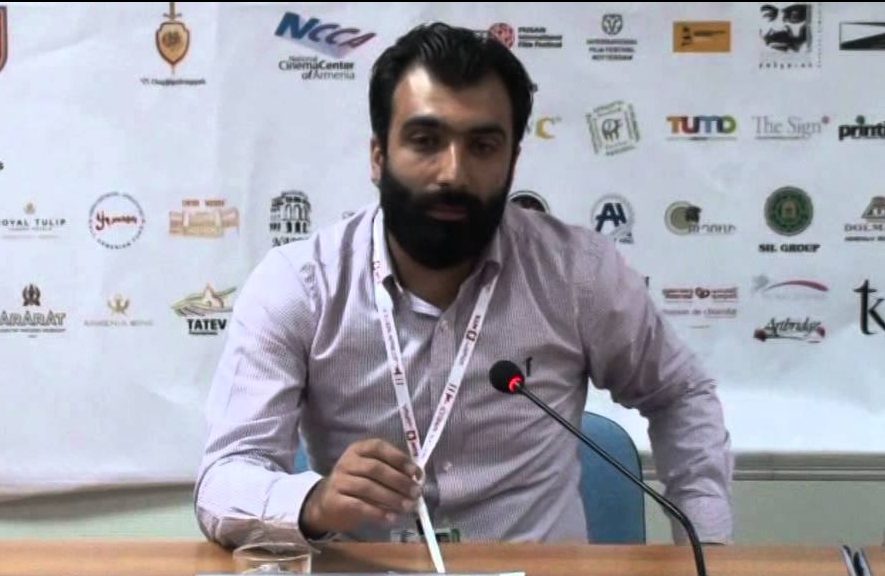Director Jivan Avetisyan at Pomegranate Film Festival, Nov 15.
Jivan Avetisyan’s The Last Inhabitant was screened at Hamazkayin Toronto’s Pomegranate Film Festival, Nov 15-19. It received an honorable mention in the Best Feature Film category for its “intimate storytelling, brilliant acting and stunning cinematography.”
TorontoHye editor Karin Saghdejian caught up with the director and had a chat with him regarding his films and the struggles behind their making.
Interview by: Karin Saghedjian
Translation by: Varak Babian
T.H.- The lion’s share of your films’ content is focused on Artsakh. Why is that?
J.A.-There’s a pretty straight forward reason. As I see it, if there are 10 issues that cause the Armenian people a certain level of concern; all 10 of them either directly or indirectly have a connection with Artsakh. It’s my opinion that each one of us have a responsibility to sort our every day, or some part of our existence, in a way that allows us to give back to our motherland. In some capacity, we need to work towards the betterment of Armenia, and specifically Artsakh; particularly because the war there is very much still alive and ongoing.
I’d be remiss to try and forget about the people that have left an impact on my life; personally, I wouldn’t be able to forget certain events that have shaped my reality. We have an obligation to remember and inform the world about our war.
Simply put- with art, with culture, we have to achieve a certain level of prestige. This will, in turn, allow us to be able to stand side by side and support the soldiers that are risking their lives to make sure our borders are safe. This is a crucial, all-encompassing process. We need to strive for greatness, and the success we achieve in Europe, in the United States, in any corner of the world- will make it that much easier for people to love and accept Artskah in their hearts. This way, we’ll get that much closer to the desired dream of an independent Artsakh, recognized unanimously by the international world.
Finally, I’m from Artsakh. It’s fulfilling for me to craft stories about my village. Not only the village, but everything good that surrounds and is associated with it as well.
We can’t share stories of love and romance, like the French. We can’t do action films like the Americans. That’s their life, their reality. We have the ability to speak about ourselves. The talking point is not only the war. It’s the culture, the people, the traditions. All this, under a common umbrella and highlighted by the vibrancy of the human disposition.
We need to find a way to present our reality- the war, our conflict to the rest of the world.
T.H.- On that note, in your films, though you deal with war, you tend to stay away from nationalistic rhetoric; focusing more on the universal angle.
J.A.- That rhetoric might fall on deaf ears. There are many people worldwide who are ignorant on the matter. They might not consider our opinion to be a plausible observation. Who do you try to sharpen and aim your sword towards?
Let’s be frank. There’s a certain viewpoint that critiques the soldier. Asking, “Why would they risk their lives? Let them live a life free of combat.” If you were to speak with the non-Armenian, in most cases they don’t comprehend the issue.
We have a tendency to do a lot of romanticizing. We have focused on toasting ourselves, getting lost in songs. We’ve forgotten to put in the work. We need to put in the work. We constantly engage in patting ourselves on the back. We’ve become our own number one fan. We’re satisfied with our own stories of heroism, our recollection of dismay and horror. Enough of circulating the same stories. Congratulating ourselves, fists pounding on the dinner table, proclaiming our strength.
We need to roll up our sleeves and prove what we believe to be true to the rest of the world. You can only connect to a wider audience by tapping into their innermost world.
This is the journey. They have to breathe through your character. The terror has to be felt by their own psyche. They need to realize that this unpredictable world is not bubble wrapped for their protection. Anything can happen.
That’s why I share stories about war, always preaching peace. I try to package this unsafe, unpredictable world into a safer one- even if it’s only for a moment.
T.H.- This was very noticeable. That might be the reason why people enjoy your work. It’s not a one-dimensional position on an issue, but the suffering of human struggle.
The villager has a relationship with his Azeri neighbor. Sometimes the villager is right, sometimes his neighbor is. The people of Artsakh becomes real in your films, they’re humanized. The individual is not only a soldier, not only a member of a military front, but a person. A person not unlike me or you, dealing with their own personal quarrel with existence.
How do you collect your stories? How do you decide which topic or idea is “worthy” enough to create a film around? What is your selection process like?
J.A.- I come across different ideas and topics in a variety of ways. After familiarizing myself with the subjects that seem to stick, I let it percolate. I come back to the story that moved me the most in the first place, and I have an honest conversation with myself. Can the idea blossom into a subject for a film? Do I have a desire to share the story? Do I find it captivating? I trust myself, because all the films that I’ve created mean something to me, I appreciate them. I consider them timely created films.
The film that I decide to embark on five years ago, ideally would be finished five years ago. Because my feelings, my thought process, my senses were moved in a specific way during that time.
I constantly try to submerge myself in fresh, different topics. That doesn’t mean the work that I’ve already created should reflect anachronism. We strive to create content that won’t quickly be uploaded to Youtube, or any other online platform. Rather, the films should circulate different film festivals, and be a part of the dialogue focusing on films across the world.
Our conceived film idea has to do with Artsakh, but not about the physical battle itself. The film has the aptness to battle for its own justice, it’s warranted rights.
It’s not a film that we’ve shot for the purpose of just being a shiny trophy that boosts our ego. The best way to attain pride through film, is in it reaching and making an impression on a wider audience. If the “other” can understand, appreciate and recognize the struggles of our tribe; if they can grasp the pain felt by a nation after losing a soldier in battle, that’s the end goal. Is there anything more important than that? For this reason, we have to have a film that encapsulates the fighting spirit. Not one that glorifies the carnage, but rather lauds peace.
Of course, we have to have the ability to educate the masses about our sometimes bitter and harsh reality. There’s often a very dry, slanted perspective offered towards our neighboring country. We believe that once you call a spade a spade, we’re ultimately in the right. Who gets to give that final conclusion?
We need to approach the subject matter the right way. We’re currently experiencing complicated times. 100 years ago, when facing the Red Genocide, the masses were easily influenced. They would be told that their tzar is evil, and that was that. Today’s individual has to be captivated in a more delicate manner. People today are swamped with information, and it makes it difficult for them to be convinced of anything. It’s not the same villager of 100 years ago, where you would be able to say “You’re high ranking official is starving you, you must kill them so that Communism can prosper, and in turn you will too.”
Today’s individual is complex. They are all-knowing. If you ask them about genocide, they will tell you all about the different stages, the different methods of extermination. If you ask them about war, they know all too well about the devastation that comes along with it.
You try to impart a specific isolated detail, a single gaze; a moment that can be compared to the viewer’s already existing internal conflict. There’s no need to show how skulls are bashed, or preach the enemy’s lack of moral fiber. The modern-day human is rarely shocked. You must rev their emotions, make them feel. It doesn’t have to be a grand gesture, sometimes all you need to do is whisper a word or two. We, as humans, have the ability to harness emotion. A human being, granted affected by the universality of sin, was created using God as a template. The human is sensitive.
T.H.-What kind of difficulties do you encounter during the process of completing your films?
J.A.- Unfortunately, the process of creating art has its limitations. To put it simply, the most considerable roadblock is the procuring of necessary finances. It’s an arduous process.
We try to spread the word, and relay the importance of Artsakh to whoever will listen. We try to locate individuals that have the desire to leave their impact on the film by helping to make the completion of it a reality. The whole process can be overwhelming. Making a film is expensive. Making a film with the production value comparable to its international counterparts takes a lot of money. It’s not enough to have two cameramen, two actors, and a director. You need production assistants, producers. You need a cast arranged with internationally recognized talent, so that the film gains attention on the international market. Many, many cogs in the wheel.
So, you have to worry about not only creating the best possible film, but being able to secure the necessary financial help. On top of that, there are political matters. Trying to persuade an actor to be featured in a film that deals with Artsakh, all the while knowing that the actor being “blacklisted” is a likely possibility. Also, you need to convince the people on the production and distribution side not to be intimidated by the aggression and bullying tactics of Azerbaijan. The truth is- every single person who has his or her name attached to the film might be flirting with danger. At one point, the Azeri will come by your door and huff, and puff, and try to blow your house down.
So, if somebody think I’m a worthy film maker, I’ll take the compliment, but it is simply not enough. I can’t be satisfied. The artistic side is rarely enough. It is an ongoing quest. From the birth of the idea of the film, to actually getting it out there for the world to see.
T.H.-The issues you have to deal with seem more complicated than those of your average production.
J.A.-The main actress in the film is Lithuanian. She is now “blacklisted”. For years she’s been presented with the story of our conflict. Not only does she act in the film, but by doing so she’s chosen to display an allegiance to a certain side of the issue. So, you have to understand, this isn’t only a film. I’ve worked with actors from Iran. These actors have been presented with my thought process, my narrative dealing with the conflict. They’ve chosen not to go to Azerbaijan for future work. It’s a multi-faceted struggle. I consider it to be an important segment of the Armenian Cause.
T.H.-Naturally, films that are similar to yours, demand enormous budgets in order to succeed. You’re a director that lives in Artskah, in Armenia. Does your current geographical place of residence make the process of securing pertinent funds even more difficult?
J.A.- I’ll try to answer in the most simple, delicate manner. The majority of help is acquired with the film being showcased at different festivals and exhibitions- specific showcases domestically and at other times, in the Diaspora. Donations also help. I’m constantly in touch with different people, representatives of different funds, organizations. I’ve been lucky enough to have relationships with individuals that believe in both me and my craft. They’re keen to accept the invitation to be a part of the completion of the work. We’re trying to garner the interest of European counterparts in hopes of transitioning production to a larger scale. There would be cooperation on the creative process, with a certain level of financial assistance as well.
There isn’t one singular way. For example, for our next film we’re using a crowd-funding page in hopes of securing financial help. Of course, this method won’t bring all the required funds. We try to find help where we can. Bit by bit, using different avenues.
Also, for my next two films, I’ve secured financial assistance and support from the Ministry of Culture of the Republic of Armenia. State sponsored help truly makes an impact.
T.H.-How much of a wide release did The Last Inhabitant enjoy? Apart from Armenia, where else was the film screened?
J.A.-We’ve had the pleasure of having the film enjoyed by audiences in the United States, Sweden, the Netherlands, Iran, Lebanon, and Canada. There’s talks of Australia being a possibility. A couple of other countries seem to be an option as well. We’ll have to wait and see how it all pans out.





